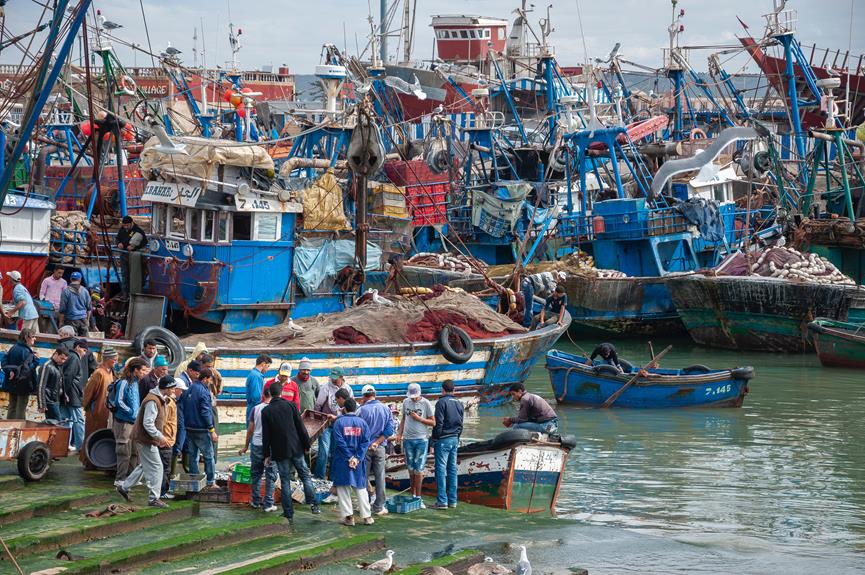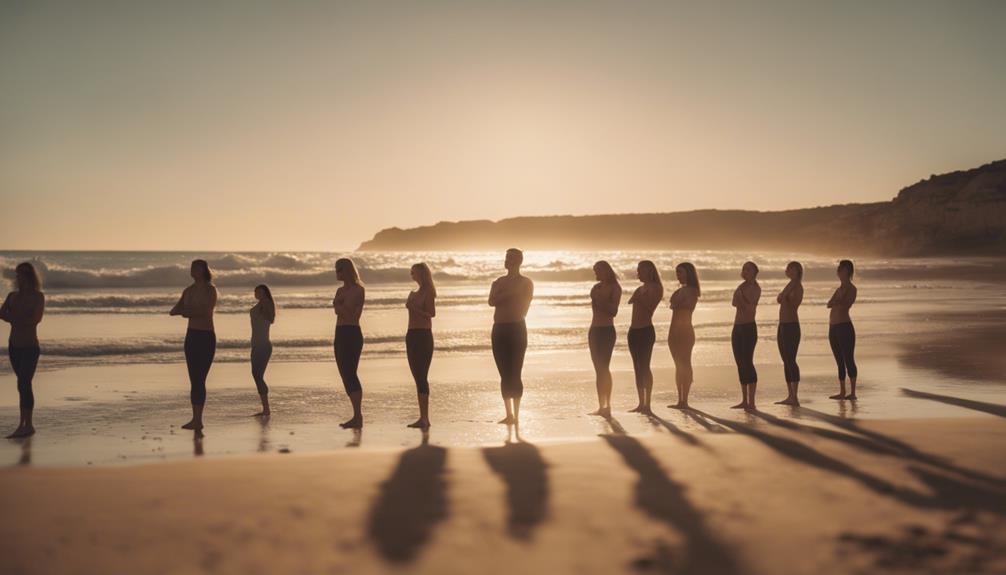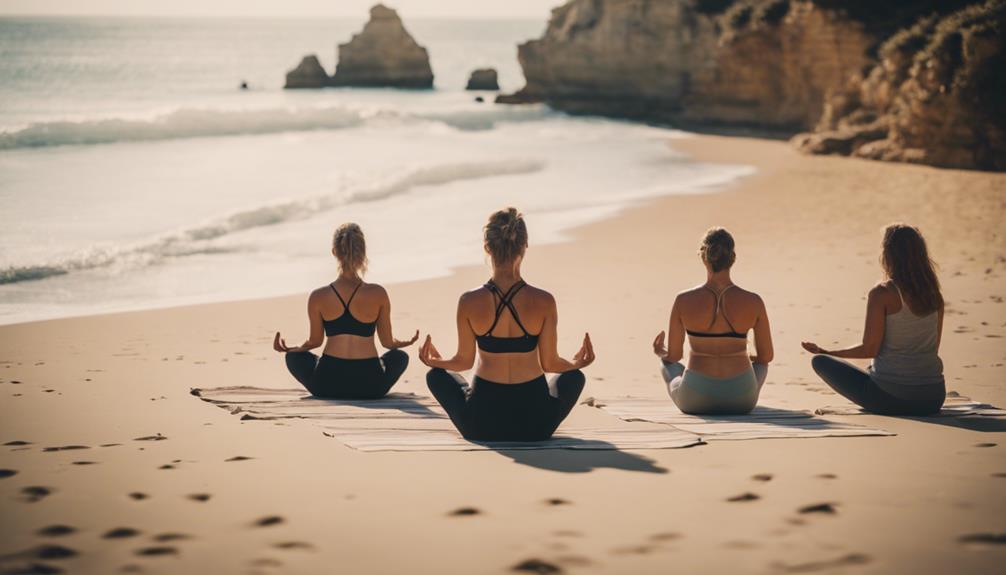As I wander through the charming streets of Algarve's fishing villages, I can't help but feel a deep connection to the authentic Portuguese way of life.
The history embedded in these villages, like Olho, is a treasure trove waiting to be discovered. The Moorish architecture that adorns the old town and the Fisherman's Quarter, a testament to the village's rich fishing heritage, are captivating.
The Municipal Museum of Olho offers a glimpse into the maritime history, while the parks and vibrant market provide moments of relaxation and sensory delight.
Exploring the islands of the Ria Formosa Natural Park allows me to truly embrace the coastal allure of Olho.
Join me in immersing ourselves in the authenticity of Algarve's fishing villages, where tradition and culture intertwine.
Key Takeaways
- The fishing villages in the Algarve hold a rich cultural heritage deeply rooted in the authentic Portuguese way of life.
- The traditional fishing methods and practices in these villages preserve the fishing heritage and allow for sustainable and efficient fishing.
- The culinary delights of the fishing villages capture the essence of the region's gastronomy, with fresh seafood being a highlight.
- The cultural events, festivals, and sustainable tourism initiatives in the fishing villages promote conservation efforts and preserve cultural traditions.
Historical Significance of Fishing Villages
As a traveler, one can't underestimate the historical significance of fishing villages in the Algarve. These charming villages, like Olhão, hold a cultural heritage that's deeply rooted in the authentic Portuguese way of life.
Olhão, a former fishing village, boasts a rich history that's evident in its architecture, museums, and festivals. The Municipal Museum of Olhão provides a fascinating insight into the city's fishing activity and maritime heritage, showcasing the importance of this industry in Portuguese culture.
The Igreja Matriz de Olhão, a stunning Baroque church, stands as a testament to Olhão's historical past and offers breathtaking panoramic views of the village. And of course, the bustling municipal market, with its vibrant atmosphere and mouthwatering regional delicacies, is a living testament to the historical significance of fishing in the area.
Embracing the authenticity of these fishing villages means immersing oneself in the rich tapestry of Portuguese history and culture.
Traditional Fishing Methods and Practices
One of the key aspects of the authenticity of Algarve's fishing villages lies in their utilization of time-honored and traditional fishing methods and practices.
These villages, like Olho, embrace their rich fishing heritage by continuing to employ techniques that have been passed down through generations.
One such method is the use of small, colorful fishing boats known as 'xavantes' that can be seen dotting the waters of the Ria Formosa. These boats are specially designed to navigate the shallow and marshy areas of the lagoon, allowing fishermen to reach areas rich in fish.
Traditional fishing nets, such as cast nets and gill nets, are also commonly used by the local fishermen. These nets are skillfully cast into the water, capturing fish in a sustainable and efficient manner.
Culinary Delights of Algarve's Fishing Villages
During my visit to Algarve's fishing villages, I indulged in the culinary delights that showcase the region's rich seafood heritage and vibrant flavors.
The Fishing Village of Olho's municipal market was a bustling hub of activity, offering an array of fresh produce and regional delicacies. The market boasted the largest fish market in the Algarve, where locals and visitors alike could find an impressive variety of seafood.
The Fisherman's Quarter reflected Olho's fishing history, and its unique architecture added to the charm of the village. I'd the opportunity to explore the islands of the Ria Formosa Natural Park, where unspoiled sandy beaches and excellent seafood awaited.
From grilled sardines to octopus rice and cataplana, a traditional Portuguese seafood stew, the culinary delights of Algarve's fishing villages truly captured the essence of the region's gastronomy.
Cultural Events and Festivals
I immersed myself in the vibrant cultural events and festivals that bring the Algarve's fishing villages to life. Here are three remarkable experiences I encountered:
- Festival do Marisco: Olhão hosts the annual seafood festival, Festival do Marisco, where locals and tourists gather to indulge in a variety of shellfish and clams. The festival also features live Fado music, a traditional Portuguese genre, and showcases local crafts. It's a celebration of the village's rich maritime heritage and culinary delights.
- Municipal Market: The Old Town of Olhão is home to the municipal market, a vibrant landmark offering fresh produce and regional delicacies. It's the largest fish market in the Algarve, bustling with fishermen unloading their catch. The market provides a glimpse into the daily life of a fishing village and allows visitors to savor the flavors of the sea.
- Igreja Matriz de Olhão: In the heart of the village stands the impressive Igreja Matriz, also known as Our Lady of the Rosary Church. Its Baroque facade is a sight to behold, and climbing to the top offers panoramic views of Olhão. The church isn't only a place of worship but also a symbol of the village's history and architectural beauty.
These cultural events and landmarks truly capture the essence of the fishing village and its traditions.
Transitioning into the next section on sustainable tourism initiatives, it's evident that preserving and promoting these cultural events and festivals is crucial for the sustainability of the fishing villages.
Sustainable Tourism Initiatives in Fishing Villages
Promoting conservation efforts and preserving cultural traditions, sustainable tourism initiatives in Algarve's fishing villages embrace the authenticity and charm of the coastal communities. One such example can be found in Olhão, a picturesque fishing village located near the Ria Formosa reserve. Here, visitors can experience the unique architecture and stroll through the picturesque streets, all while supporting sustainable tourism practices.
In Olhão, the Fisherman's Quarter is a testament to the village's commitment to sustainable tourism. This vibrant neighborhood showcases the rich fishing history of the area, providing visitors with a glimpse into the traditional way of life. Additionally, the municipal market in Olhão promotes sustainability by featuring local produce and regional delicacies, contributing to the preservation of traditional culinary practices.
Furthermore, the annual seafood festival in Olhão not only celebrates the local seafood but also emphasizes the importance of sustainable fishing practices and marine conservation. This event brings the community together to raise awareness and educate visitors about the need to protect the marine ecosystem.
By offering eco-friendly activities such as snorkeling and exploring unspoiled beaches, the Ria Formosa Natural Park encourages sustainable tourism in the region. Visitors can immerse themselves in the beauty of the coastal ecosystem while contributing to its conservation.
Frequently Asked Questions
Which Is Better Faro or Tavira?
I think Tavira is better than Faro. The best time to visit is in the spring or fall. Tavira has hidden gems, delicious local cuisine, and top attractions like its historic buildings and beautiful beaches.
Is Algarve Too Touristy?
No, the Algarve isn't too touristy. While there are popular spots, there are also authentic cultural experiences, hidden gems, and off the beaten path destinations. It's about embracing local traditions and practicing sustainable tourism.
Is It the Algarve or Algarve?
Is it the Algarve or Algarve? Well, let me tell you, exploring the Algarve's fishing villages is like stepping into a time machine. Immerse yourself in the authentic charm of traditional fishing communities and embrace the richness of Algarve's cultural heritage.
What Is the Alternative to the Algarve?
The alternative to the Algarve is a world of hidden gems, undiscovered charm, and off the beaten path destinations. These lesser known places offer untouched beauty and a chance to escape the crowds and find serenity.
Conclusion
In the enchanting embrace of Algarve's fishing villages, time seems to stand still, allowing visitors to immerse themselves in the rich tapestry of Portuguese culture.
The gentle sway of the fishing boats, the tantalizing aromas of freshly caught seafood, and the vibrant hues of the local festivals transport you to a world where tradition and authenticity reign supreme.
Embrace the allure of these coastal gems and let the magic of Algarve's fishing villages captivate your heart forever.



